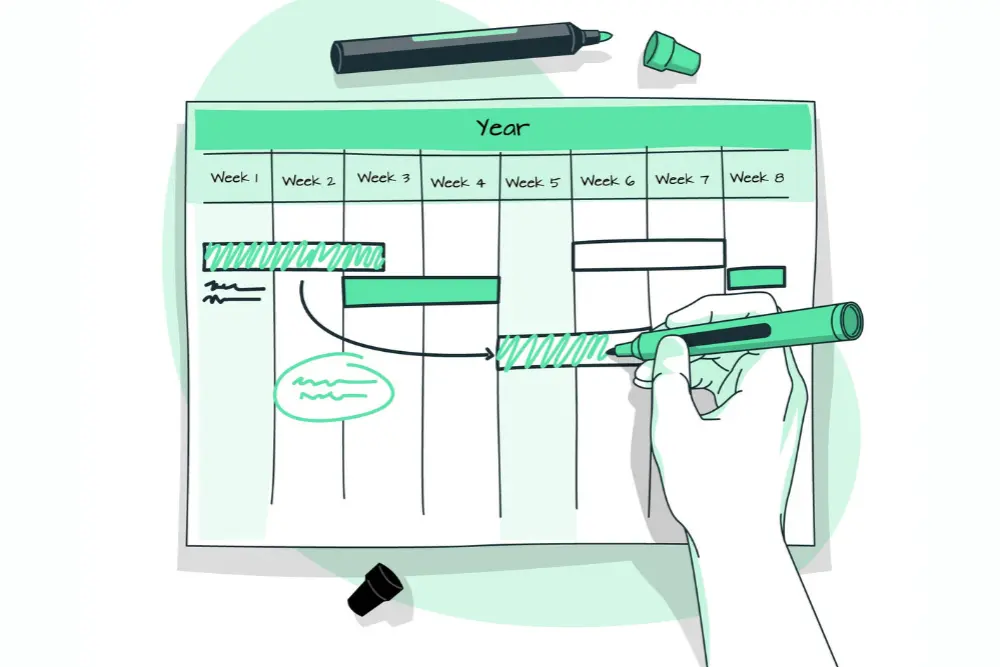Physical Address
304 North Cardinal St.
Dorchester Center, MA 02124
Physical Address
304 North Cardinal St.
Dorchester Center, MA 02124

A career growth plan is not just a roadmap; it’s a dynamic framework that steers you toward professional fulfillment. In a world brimming with opportunities and competition, having a well-structured plan is indispensable for achieving success. It enables you to visualize your aspirations, organize your efforts, and stay on course even amidst challenges.
Clear goals form the backbone of professional development. They transform vague ambitions into tangible milestones, allowing you to measure progress and remain motivated. With clarity and precision, your goals can serve as a compass guiding you through every twist and turn in your career journey.
Self-awareness is vital for a successful Career Growth Plan. Start by assessing your skills and strengths—what energizes you and where you excel. Use tools like SWOT analysis to identify strengths, weaknesses, opportunities, and threats, creating a clear baseline for growth.
Equally important is recognizing areas for improvement. Seek feedback from peers or mentors to uncover gaps in skills or knowledge, focusing on where effort can yield the most impact.
Lastly, reflect on your career satisfaction and aspirations. Are you fulfilled in your role, or do you seek more? Aligning your plan with your motivations ensures it’s both strategic and meaningful.

Envisioning Your Ideal Career Path
Visualize where you want to be in five, ten, or even twenty years. Do you see yourself leading a team, becoming a thought leader, or perhaps starting your own business? This vision acts as the north star, giving direction to your efforts.
Determining What Success Means to You
Success is subjective. For some, it means financial independence; for others, it might mean achieving work-life balance or making a societal impact. Define success on your terms to craft a plan that resonates with your values.
Aligning Your Career Vision with Personal Values
Your Career Growth Plan should align with your personal beliefs and core values. When your professional goals complement your ethics, you create a foundation of sustained motivation and authenticity, making your work more fulfilling and meaningful.

What Are SMART Goals and Why Do They Work?
SMART goals are Specific, Measurable, Achievable, Relevant, and Time-bound. They provide structure and accountability, turning abstract dreams into actionable objectives.
Breaking Down Long-Term Goals into Manageable Steps
Big goals can feel daunting, but breaking them into smaller milestones makes them attainable. For example, if you aim to become a manager, start by developing leadership skills and seeking mentorship.
Examples of SMART Career Goals for Various Industries

Understanding Trends and Opportunities in Your Field
Stay informed about industry developments. Read reports, follow thought leaders, and attend conferences. This knowledge helps you anticipate opportunities and prepare for changes.
Identifying In-Demand Skills and Competencies
Determine which skills are in high demand in your industry. For instance, data analysis and artificial intelligence are currently sought after across many sectors.
Researching Career Paths and Growth Potential
Explore the typical career trajectory in your field. What qualifications or experiences are required at each level? Use this information to chart your progression.

Pinpointing Skills Needed for Your Goals
Identify the skills you need to achieve your goals. If you aspire to be a project manager, focus on developing leadership, communication, and organizational skills.
Choosing the Right Training and Resources
Select learning avenues that fit your style, whether it’s online courses, workshops, or formal education. Platforms like Coursera, LinkedIn Learning, or local institutions can be excellent resources.
Gaining Experience Through Projects and Volunteer Work
Practical experience solidifies learning. Volunteer for challenging projects at work or offer your expertise to non-profits. These opportunities not only build skills but also enrich your résumé.

The Importance of Mentorship and Professional Connections
Mentors provide guidance, feedback, and insight into industry nuances. Surrounding yourself with experienced professionals can accelerate your career growth.
Strategies for Expanding Your Network
Attend industry events, participate in online forums, and join professional organizations. Networking is not just about collecting business cards; it’s about building meaningful relationships.
Leveraging Social Media and Professional Platforms
Platforms like LinkedIn can be powerful tools for networking. Share insights, engage with content, and connect with professionals who inspire you.

How to Measure Success Along the Way
Set benchmarks to evaluate your progress regularly. Use metrics like completed certifications, promotions, or feedback from peers to gauge your growth.
Adjusting Your Plan as Circumstances Change
Life is unpredictable. Be open to revising your plan to accommodate new opportunities or challenges. Flexibility ensures resilience in the face of change.
Celebrating Milestones and Small Wins
Every achievement, no matter how small, deserves recognition. Celebrating these moments keeps you motivated and reinforces your commitment.

Handling Setbacks and Roadblocks
Obstacles are inevitable, but they are also opportunities for growth. Approach setbacks with curiosity, not frustration, and learn from them.
Staying Focused in a Competitive Environment
Focus on your journey rather than comparing yourself to others. Use competition as inspiration, not intimidation.
Maintaining a Growth Mindset
Embrace challenges as learning opportunities. A growth mindset fosters resilience and keeps you striving for improvement.

Creating a Routine That Supports Your Goals
Incorporate daily habits that align with your plan, such as reading industry news, practicing new skills, or networking.
Balancing Career Development with Personal Responsibilities
Avoid burnout by setting boundaries. Allocate specific times for career activities without neglecting personal commitments.
Staying Consistent Without Burning Out
Consistency is key, but so is rest. Take breaks and recharge to maintain long-term productivity.

Your career growth plan is a living document, not a rigid script. By following these steps, you can create a blueprint that adapts to your ambitions and circumstances. Start today, and take that first step with confidence. Your future self will thank you for it.
Success is not a destination; it’s a journey fueled by clear goals and deliberate actions. Take charge of your career and transform your aspirations into achievements.
1. What is a career growth plan?
A career growth plan is a structured strategy that outlines your professional aspirations, the steps needed to achieve them, and the resources or skills required along the way. It helps you stay focused, track progress, and adapt to changing circumstances.
2. Why is a career growth plan important?
It provides clarity and direction, helping you set realistic goals, identify opportunities, and make informed decisions about your career. It also enhances motivation and keeps you accountable.
3. What are SMART goals, and how do they help in career planning?
SMART goals are Specific, Measurable, Achievable, Relevant, and Time-bound. They break down broad ambitions into actionable steps, making it easier to track progress and stay motivated.
4. How do I identify my current skills and areas for improvement?
Start with a self-assessment by listing your strengths and weaknesses. Seek feedback from colleagues, mentors, or supervisors. Use tools like SWOT analysis or career assessment platforms for a more structured approach.
5. What should I consider when defining my long-term vision?
Think about your ideal role, desired lifestyle, and what success means to you. Consider how your personal values align with your professional aspirations to ensure long-term satisfaction.
6. How can I find in-demand skills for my industry?
Research industry reports, job postings, and professional forums. Follow trends and advancements through blogs, webinars, or conferences. Networking with industry professionals can also provide insights.
7. What are some effective ways to develop new skills?
Take advantage of online courses, workshops, certifications, and mentorship opportunities. Practice through real-world projects or volunteer work to gain hands-on experience.
8. How important is networking in career growth?
Networking is crucial. It opens doors to new opportunities, provides access to industry insights, and connects you with mentors or collaborators who can support your journey.
9. How do I track progress in my career growth plan?
Set measurable milestones and review them periodically. Use tools like career journals or project management apps to monitor achievements and identify areas for improvement.
10. What should I do if I encounter setbacks or challenges?
View challenges as opportunities to learn and grow. Analyze what went wrong, adjust your plan accordingly, and seek guidance from mentors or peers when needed.
11. How can I stay motivated over the long term?
Break goals into smaller, achievable tasks. Celebrate milestones, stay flexible, and remind yourself of your long-term vision. Maintaining a growth mindset is key to overcoming challenges and staying inspired.
12. How do I balance career development with personal responsibilities?
Prioritize and schedule your time effectively. Set boundaries to ensure you dedicate time to both professional and personal commitments. Avoid overloading yourself to prevent burnout.
13. Can I revise my career growth plan once it’s created?
Absolutely. A career growth plan should be a living document. Regularly review and adjust it to reflect changes in your interests, goals, or external circumstances.
14. How can I ensure consistency without burning out?
Incorporate manageable habits into your daily routine and recognize when to take breaks. Remember that consistency doesn’t mean perfection; it’s about steady progress over time.
15. What’s the first step I should take today to start my career growth plan?
Start by assessing where you currently stand. Reflect on your strengths, weaknesses, and aspirations. Then, outline one clear, achievable goal to work toward in the short term.